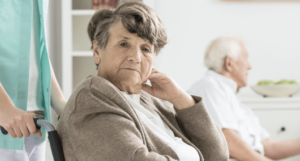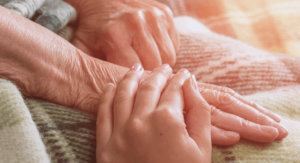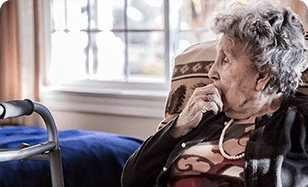What Causes Nursing Home Abuse?
The causes of nursing home abuse can be numerous. Although most nursing home staff genuinely have the residents’ best interests in mind, one in three seniors reports having experienced or witnessed elder abuse.

When you consider the potential causes of nursing home abuse, you start to see how it can be such a common occurrence. Perhaps an obvious cause of nursing home abuse is staff members of nursing homes with a mean streak. There is certainly some of this, but abuse can also happen when well-meaning staff members are poorly trained or when a nursing home is understaffed.
There could even be some policies and practices from the nursing home company that contribute to abuse.
Structural and Corporate Causes of Nursing Home Abuse
Nursing home abuse causes can range from a single employee having a bad day and taking it out on a resident all the way up to a purposeful decision that impacts dozens or hundreds of nursing homes.
According to the National Library of Medicine, ownership of nursing homes has become increasingly complicated in recent years. This is connected to a growing trend of treating nursing homes as investments.
In other words, there may be an increased motive in the elder care business to maximize profits in an environment with regulation difficulties and subsequent oversight.
Imagine all the ways this can cause nursing home abuse or neglect:
- Attempts to spend as little as possible can mean discouraging or denying needed medical care
- Cost savings for background checks and investigations may lead to hiring unqualified or even abusive workers
- Financial motivation can reduce internal oversight or even encourage hiding problems to avoid fines or negative press
- Low pay may lead to employees who don’t care and to employee shortages
- Understaffing can contribute to elder neglect, improper care for residents, and poor hygiene which can contribute to bedsores, infection, and general poor health
While incidents of abuse or neglect can happen despite responsible and caring leadership and ownership, treating nursing homes — and nursing home residents — as investments makes elder abuse and neglect in nursing homes far more likely.
Common Forms of Elder Abuse
One of the most disturbing facts about nursing home abuse is the underreporting of incidents.
The National Center for Victims of Crimes estimates that for every one case of elder abuse reported, 24 go unreported.
Physical Abuse
The most obvious type of nursing home abuse is physical abuse. Physical elder abuse is the purposeful use of force against an elderly person — it can include hitting, kicking, or physically restraining an older person.
Another physical type of abuse that can affect nursing home residents is sexual abuse. Any non-consensual sexual contact with an older person is a form of sexual abuse. This includes any sexual contact with those suffering from conditions that prevent them from giving consent, such as Alzheimer’s disease, dementia, or other cognitive impairments that can come with age.
Neglect
Nursing home neglect occurs when a caregiver fails to act to protect a resident from harm. This can include failure to provide adequate food or drink, failure to tend to physical needs, or neglecting to provide needed medication or medical care.
Unfortunately, the risk for elder neglect is particularly high in nursing homes and assisted living facilities with demanding residents and staffing issues.
Elder self-neglect occurs when an older person is no longer able to meet their own daily needs and, as a result, starts to suffer. Many older people struggle with losing their independence, and may not want to confront the reality that they can no longer feed, dress, or maintain themselves.
Self-neglect should never occur in a nursing home, however. When there are professional caregivers who are meant to be looking after an older person, signs that may suggest the presence of self-neglect indicate that the caregivers are neglecting their responsibilities.
Psychological and Emotional Abuse
An intentional act that inflicts fear, distress, or emotional pain on an older person is emotional elder abuse. This can take many forms, such as threats or insults. Nursing home emotional abuse can also include cutting off a resident’s contact with loved ones.
Elder abandonment is a type of abuse that can be considered psychological abuse. However, it could also be considered a form of neglect. This is the term for a caregiver simply ceasing to provide care or support without notice.
Financial Abuse
Nursing home financial abuse is the unauthorized use of an older individual’s resources. According to a study, elder financial abuse costs older adults an estimated $2.9 billion every year.
How Common is Nursing Home Abuse?
In 2020, over 15,000 complaints filed with nursing home ombudspersons were about abuse or neglect. When you consider that nursing home abuse — like most crimes — is often unreported, the actual number could be significantly higher.
According to a 2018 report from the National Center for Victims of Crime, nursing home abuse complaints fall into the following categories:
- 07% — financial abuse
- 14% — neglect
- 21% — psychological abuse
- 29% — physical abuse
- 22% — resident abuse (one resident harming another, either physically or sexually)
- 07% — sexual abuse
Warning Signs of Nursing Home Abuse

There are many different signs to look for that may indicate your loved one is suffering from nursing home abuse. Among the most telling — and a sign that applies to all forms of elder abuse — is that the nursing home staff offers poor explanations or seems evasive about harm to a resident.
Whether the issue is money that is unaccounted for, reports of neglect, insulting or cruel conduct, or bruises and other injuries, someone at the facility should be able to explain the cause of the harm.
Specific signs to look for in an elderly person that may indicate nursing home abuse include:
- Appearing scared or withdrawn
- Extreme weight loss
- Increased isolation from friends or family
- New sexually transmitted diseases/infections
- Poor personal hygiene
- Problems walking or sitting
- Sudden changes in behavior or personality
- Trips to different hospitals or emergency rooms
- Unclean or unsafe environment
- Unexplained injuries like burns, cuts, bruises, or broken bones
- Unpaid bills
What To Do About Nursing Home Abuse
Nursing home abuse causes trauma and injury. Due to the age of the victims, it can often shorten their final years. Because of the increased vulnerability to abuse that older adults have, it’s essential to be aware of potential abuse and to take action.
If you suspect nursing home abuse:
- For emergency help, call 911.
- Keep in contact with loved ones.
- Report abuse.
- Take accusations seriously.
Although the harm that nursing home abuse causes is irreversible, you may be entitled to compensation through a nursing home abuse lawsuit. Our team of experts can evaluate your case and help determine your eligibility.
A nursing home abuse lawsuit can help with covering the cost of treatment — both physical and psychological — as well as the costs of moving your loved one to a safer facility. Get your free case evaluation now to see if you can pursue an elder abuse case and hold those who harmed your loved one responsible.
FAQs About Nursing Home Abuse Causes
Who can report nursing home abuse?
Anyone who suspects nursing home abuse can report it.
In the case of emergencies, you can call 911. When it is not an emergency, calling the police is still a valid option, as is contacting a nursing home abuse hotline or Adult Protective Services in your state.
What causes nursing home abuse and neglect to be so common?
While it is difficult to determine one explanation for how common elder abuse and neglect are, there are several factors involved.
Elderly adults are often more vulnerable to abuse due to physical and mental decline that comes with age and the unprecedented access tied to live-in care facilities like nursing homes. Additionally, many nursing homes are understaffed and may have a lack of training and oversight.
Finally, studies suggest that barely a fraction of elder abuse cases are reported, which, sadly, makes it easier for people to get away with nursing home abuse.
The best way to make elder abuse less common is to take it seriously and make sure that those who harm older adults are held responsible.
What are the warning signs for nursing home abuse?
Some warning signs to look for to indicate possible nursing home abuse include:
- Bedsores
- Bruises, broken bones, cuts, or other injuries
- Dehydration and malnutrition
- Fearfulness, lack of eye contact, or behavior changes
- Infections – especially new sexually transmitted infections
- Unexplained weight loss
These are all cause for concern, especially if the staff cannot provide adequate explanations.
 Get Legal Help Now
Get Legal Help Now
